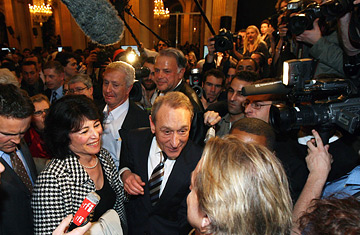
Paris Mayor, Bertrand Delanoe is cheered by supporters as he passes in the second round municipal elections.
Apparently, resounding electoral defeat has left France's ruling conservatives a little hard of hearing. Because scarcely minutes after the opposition Socialists registered dramatic advances in the final round of country-wide municipal polling on Sunday evening, members of the French government claimed they hadn't heard the faintest note of voter disgruntlement. Despite a drubbing in towns and cities across France, officials in President Nicolas Sarkozy's cabinet pledged they'd continue their reformist drive with even more energy than before.
Prime Minister François Fillon said it was "unwise to draw national lessons from those local elections," repeating his government's conviction that local contests did not reflect voters' disappointment with Sarkozy's reform drive. "As the President has promised, we'll continue these policies because it takes tenacity to reform our country, and because democracy demands we keep our promises."
But Fillon and his allies had a hard time denying that the center right took a thumping locally; some 20% of voters told pollsters they had cast ballots expressly to demonstrate opposition to Sarkozy and his cabinet's actions. The result was a victorious surge by France's left-of-center parties, led by the previously floundering Socialists. Leftist wrenched 40 cities from conservative incumbents, including 30 with 20,000 or more inhabitants; rightists nabbed just six from outgoing leftist administrations. In Paris, incumbent Socialist mayor Betrand Delanoë added eight points to his razor-thin margin of victory in 2001 — not only winning an outright majority of the city council, but also positioning himself as a favorite in an expected showdown with former presidential candidate Ségolène Royal for the party's leadership later this year. Socialist-led tickets captured France's third-largest city, Toulouse, after 37 years of conservative domination. They also claimed Strasbourg, Saint-Etienne, Blois, Caen, Reims, Metz and Rouen from the right. Leftists were meanwhile returned to power in Lyon, Lille, Rennes, and Montpellier, taking 49.5% of the nation's popular vote versus 47.5% for the right. Sarkozy's governing conservative Union for a Popular Movement (UMP) averted near total collapse by narrowly hanging on to Marseille, and standing firm in bastions like Nice, Orleans, Le Havre, and Bordeaux.
"The left has the majority in votes, and will have a majority in the number of cities and departments it holds," declared Socialist leader François Hollande. "The President of the Republic must hear the message of French voters."
But with Fillon and other leading conservatives adamant their municipal setback would not affect the mandate for sweeping reform got from voters just 10 months ago, some pundits accused the right of being intentionally autistic in ignoring Sunday's outcome. "Monsieur le Président, someone has to inform you: you lost these municipal elections, and badly," wrote Laurent Joffrin, editor-in-chief of the leftist daily Libération in his Monday editorial. "With a Soviet-grade excess of hypocrisy, your accomplices, spokespeople, and your Prime Minister have maintained the contrary, [but] this first vote held just 10 months after your election has resulted in a resounding repudiation."
Most commentators agreed that Sunday's result was largely motivated by voter unhappiness with Sarkozy, whose approval ratings have falling to 37% from 67% just 8 months ago. Yet there are also renewed signs that anger was sparked more by Sarkozy's flashy, arrogant style, and not with the policies he and his government have applied. Indeed, new polls show 58% wanting Sarkozy to adopt the more sober, distant profile traditional of French Presidents. At the same time, however, 67% said they want him to continue applying the reform platform he was elected on prompting the right-wing daily Le Figaro to headline its Monday editorial "The Reforms, Faster and Stronger."
Sarkozy has said he will avoid the traditional ritual of a major government shakeup that often follow electoral setbacks. His own decidedly more discreet behavior in the past few weeks suggests he may have learned important lessons about what kind of profile the French expect from Elysée residents. His public insulting of an elderly detractor on a rope-line last month notwithstanding, Sarkozy has made an effort to control his sharp tongue, keep his love life away from the press, and scale back his former media omnipresence to occasional, sober appearances and speeches more in line with what the French are used to in their President. Ironically, Sarkozy's advisers also believe his imploding popularity — combined with public backing of reform — will make it all the easier for them to press ahead with unpleasant restructuring of France's economy and society. They say the eventual appearance of gain after the initial period of reformist pain may help lift the President's numbers, and leave the right well positioned for presidential and legislative elections in 2012. That could mean beautiful music for Sarkozy and his conservative allies; but it could also reflect a bad case of political tone-deafness.
